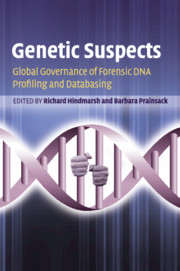1 - Introducing Genetic Suspects
Published online by Cambridge University Press: 05 October 2012
Summary
This book investigates the impacts and implications for governance of one of the most successful and yet controversial developments in recent science and technology history: the introduction of DNA profiling and databasing into the criminal justice system, which began in 1988, when English baker Colin Pitchfork was the first person convicted through the use of DNA evidence (Sanders 2000). The increasing use of DNA evidence in criminal investigations and in court soon assumed the role of a new ‘language of truth’, following on from traditional fingerprinting. While DNA profiling, on a case-by-case basis, had been used since the late 1980s, it was the establishment of centralised national registries of DNA profiles for police and forensic use 5 to 10 years later which made possible the wider and systematic use of DNA technologies in criminal investigation. Computerised forensic DNA databases enabled authorities to compare profiles from crime scenes and subjects against and between each other on an automated basis and on a large scale. The first national forensic DNA database of this kind was implemented in 1995 in the UK, followed by New Zealand, several European countries, and the USA and Canada (Walsh et al. 2004: 36). Australia and many other countries across the globe followed suit.
Despite the many declarations by proponents, especially law enforcement agencies and forensic scientists, that forensic DNA profiling and databasing play an increasingly useful part in curbing crime, and despite popular TV shows like Crime Scene Investigation (CSI) and Silent Witness and other cultural sites that show these elements almost exclusively in a favourable light, many issues have, in fact, steadily emerged and grown in connection with this relatively new practice.
- Type
- Chapter
- Information
- Genetic SuspectsGlobal Governance of Forensic DNA Profiling and Databasing, pp. 1 - 12Publisher: Cambridge University PressPrint publication year: 2010



